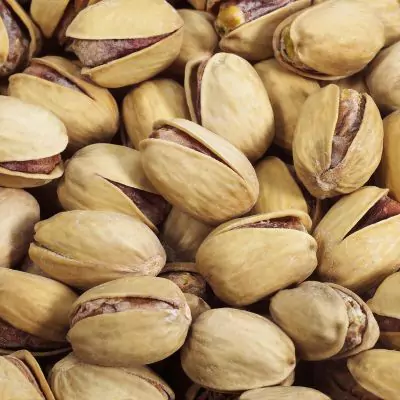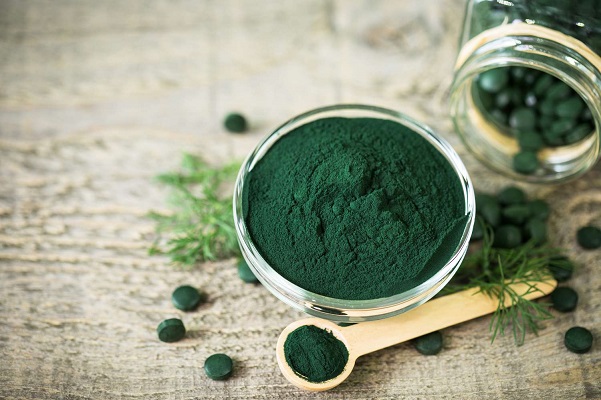On This Page
Overview
The cashew family includes the pistachio, often known as pista. Pistachios are a preferred snack because of their crisp texture and mouth watering flavor. Pista is regarded as one of the most beneficial superfoods because it has a low-calorie count and a high protein and healthy fat content. They come in a variety of yellow and green hues, both with and without shells. They typically flourish in warm, dry regions. The Greek term “Pistakion,” which means the green nut, gave pistachios their name. The green kernels are surrounded by a thin reddish skin, and they have a firm, white covering around them.
Synonyms of Pista
- Pistacia vera
- Pistacia trifolia
- Pistacia macrophylla
- Pistacia officinarum
Nutritional Facts of Pista
Serving about 49 pistachios including the following
| Calories: | 159 |
| Carbs: | 8 grams |
| Fiber: | 3 grams |
| Fat: | 13 grams |
| Protein: | 6 grams |
Phytochemical Constituents of Pistachios
- Potassium
- γ-tocopherol
- Vitamin K
- Phytosterols
- Xanthophyll carotenoids.
Therapeutic Uses of Pistachios
- Controls Diabetes
Pistachios have a low glycaemic index, which prevents them from raising blood sugar levels while simultaneously raising levels of peptide 1, a hormone that controls glucose levels. Additionally, there is evidence to support the concept that including pistachios in one’s diet can improve one’s blood pressure, glycaemic profile, and ability to control inflammation and obesity in diabetics. Additionally, the antioxidants, carotenoids, and phenolic components included in pistachios help to manage blood sugar levels.
- Fight Inflammation
Pistachios have anti-inflammatory properties and bioactive compounds that can be utilized both to treat and prevent inflammation. Also a useful source of monounsaturated fats.
- Beneficial for Women
Additionally, pistachios can treat and prevent PCOS in females. This is because it normalizes hormone levels and lowers the body’s insulin levels. According to research, PUFA and MUFA-rich nuts help maintain healthy levels of insulin, testosterone, and cholesterol.
- They Enhance Nerve Function
Improved nerve function tops the list of pistachio health advantages. Because pistachio nuts are a great source of vitamin B6. This nutrient is crucial for neurotransmission. Additionally, the levels of stress-relieving chemicals like melatonin and serotonin are increased by these delicious nuts. You get better sleep as a result, and you feel more at ease during the day.
Ayurvedic Aspects of Pistachios
Pistachio provides the body with equally healthy amounts of carbs, proteins, vitamins, and minerals. They provide practical advantages like preserving skin hydration, enhancing digestion, and shielding the eye from growing early signs of aging. It is caused by an exacerbated Vata, According to Ayurveda. The pistachio and its oil aid in reducing wrinkles and boosting skin hydration levels. This is a result of its Snigdha (oily) composition. Additionally, it makes the skin supple and radiant and aids in removing excessive dryness.
According to Ayurveda, pistachio oil can be applied to the skin to help avoid sunburn because of its Roman healing tendency. It’s important to remember that using pistachio in excess can lead to rapid weight gain in obese individuals.
Daily Dose: It is advised to consume 44 g of pistachios per day.

Have A Health Issue?
Consult Online
- Dr. Sahil Gupta (B.A.M.S., M.H.A.)
Ayurvedic Allergy Specialist
CEO & Founder of IAFA®
Side Effects of Pistachios
Pistachios should not be eaten by anyone who is allergic to tree nuts. An allergy to tree nuts may include nausea, cramping, irritation in the mouth, vomiting, difficulty swallowing, and nasal congestion.
- May Cause Aflatoxin Allergy
Aflatoxin, a carcinogen generated by the fungus Aspergillus flavus, is likely to contaminate pistachios during their growth and storage in the warm, moist climate.
Aflatoxin-tainted pistachio eating over an extended period may raise the risk of hepatitis B and liver cancer.
- Kidney Stones
Oxalates and methionine are present in pistachios in a moderate proportion.
Oxalates found in pistachios may bond with minerals like calcium and potassium to generate calcium oxalates and potassium oxalates, which can raise the risk of kidney stones when consumed in excess.
- Can Impact the Digestive System
Pistachios are quite high in fiber. As a result, eating a lot of pistachios will upset your stomach and result in diarrhea, cramps, abdominal pain, intestinal pain, and irritable bowel syndrome (IBS).
- High Blood pressure
Excessive pistachio consumption might raise blood pressure. You might also become dizzy, have blurry vision, be confused, and faint. Additionally, eating salted pistachios may cause your blood sodium levels to rise, raising your risk of contracting numerous cardiovascular diseases like hypertension.
Conclusion
As they include essential nutrients including vitamin E, vitamin C, protein, fibre, folate, and minerals, pistachios are a healthy nut for humans. The beta-carotene, antioxidants, anthocyanins, zeaxanthin, flavonoids, and proanthocyanidins are also abundant in them. These nutrients aid in the healing of inflammation, support weight loss, enhance digestion, lower the risk of cardiovascular illnesses, and sleep quality. Everything, meanwhile, only has health benefits when it is used in moderation.
Pistachio overconsumption may also cause allergies, weight gain, an increased risk of cancer, kidney stones, digestive issues, and high blood pressure.
So take advice from our nutritionist before consuming it in moderation or if you notice tree nut allergy due to pistachio you can also schedule an appointment with Dr. Gupta at IAFA® who through ayurvedic management manages your allergy.









